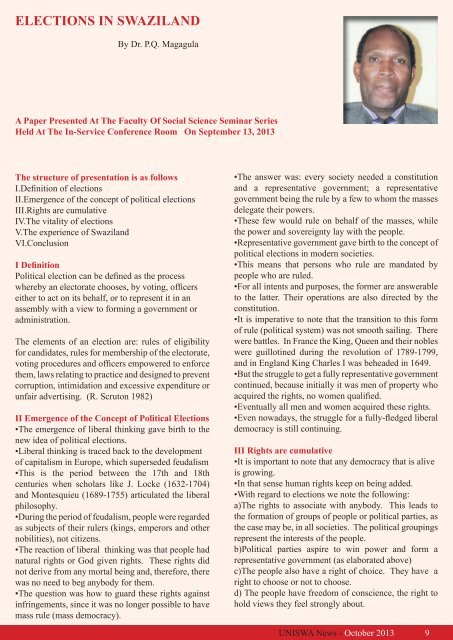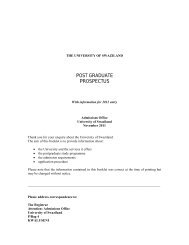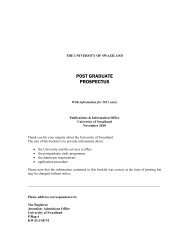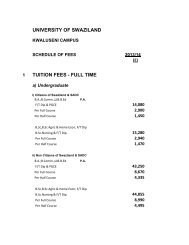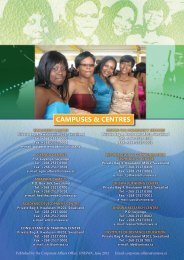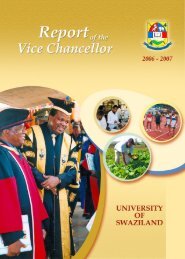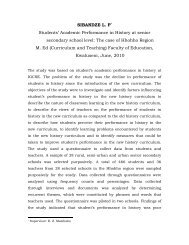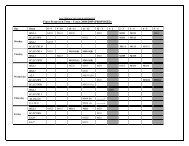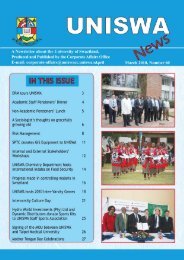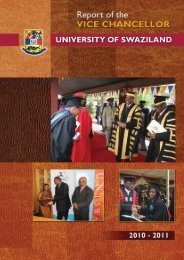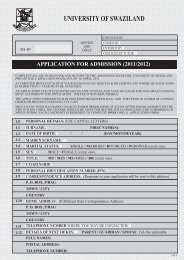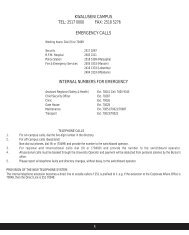UNISWA
October 2013 - University of Swaziland
October 2013 - University of Swaziland
- No tags were found...
Create successful ePaper yourself
Turn your PDF publications into a flip-book with our unique Google optimized e-Paper software.
ELECTIONS IN SWAZILANDBy Dr. P.Q. MagagulaA Paper Presented At The Faculty Of Social Science Seminar SeriesHeld At The In-Service Conference Room On September 13, 2013The structure of presentation is as follows:I.Definition of electionsII.Emergence of the concept of political electionsIII.Rights are cumulativeIV.The vitality of electionsV.The experience of SwazilandVI.ConclusionI DefinitionPolitical election can be defined as the processwhereby an electorate chooses, by voting, officerseither to act on its behalf, or to represent it in anassembly with a view to forming a government oradministration.The elements of an election are: rules of eligibilityfor candidates, rules for membership of the electorate,voting procedures and officers empowered to enforcethem, laws relating to practice and designed to preventcorruption, intimidation and excessive expenditure orunfair advertising. (R. Scruton 1982)II Emergence of the Concept of Political Elections•The emergence of liberal thinking gave birth to thenew idea of political elections.•Liberal thinking is traced back to the developmentof capitalism in Europe, which superseded feudalism•This is the period between the 17th and 18thcenturies when scholars like J. Locke (1632-1704)and Montesquieu (1689-1755) articulated the liberalphilosophy.•During the period of feudalism, people were regardedas subjects of their rulers (kings, emperors and othernobilities), not citizens.•The reaction of liberal thinking was that people hadnatural rights or God given rights. These rights didnot derive from any mortal being and, therefore, therewas no need to beg anybody for them.•The question was how to guard these rights againstinfringements, since it was no longer possible to havemass rule (mass democracy).•The answer was: every society needed a constitutionand a representative government; a representativegovernment being the rule by a few to whom the massesdelegate their powers.•These few would rule on behalf of the masses, whilethe power and sovereignty lay with the people.•Representative government gave birth to the concept ofpolitical elections in modern societies.•This means that persons who rule are mandated bypeople who are ruled.•For all intents and purposes, the former are answerableto the latter. Their operations are also directed by theconstitution.•It is imperative to note that the transition to this formof rule (political system) was not smooth sailing. Therewere battles. In France the King, Queen and their nobleswere guillotined during the revolution of 1789-1799,and in England King Charles I was beheaded in 1649.•But the struggle to get a fully representative governmentcontinued, because initially it was men of property whoacquired the rights, no women qualified.•Eventually all men and women acquired these rights.•Even nowadays, the struggle for a fully-fledged liberaldemocracy is still continuing.III Rights are cumulative•It is important to note that any democracy that is aliveis growing.•In that sense human rights keep on being added.•With regard to elections we note the following:a)The rights to associate with anybody. This leads tothe formation of groups of people or political parties, asthe case may be, in all societies. The political groupingsrepresent the interests of the people.b)Political parties aspire to win power and form arepresentative government (as elaborated above)c)The people also have a right of choice. They have aright to choose or not to choose.d) The people have freedom of conscience, the right tohold views they feel strongly about.<strong>UNISWA</strong> News - October 2013 9


